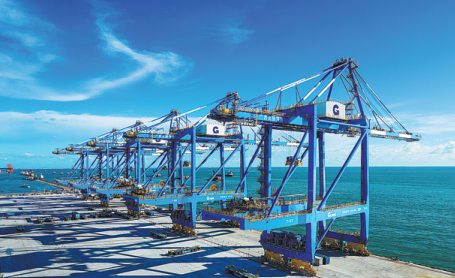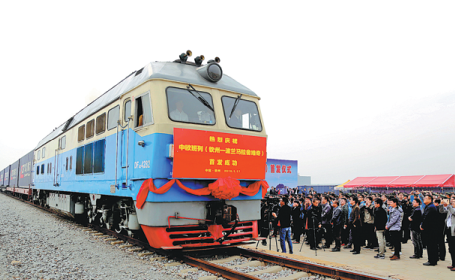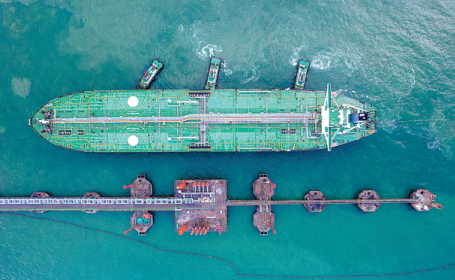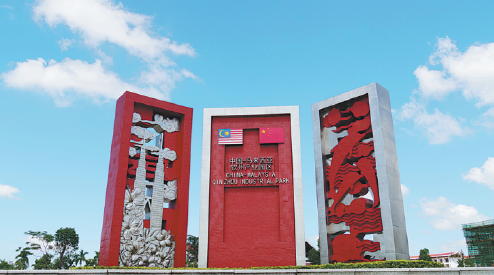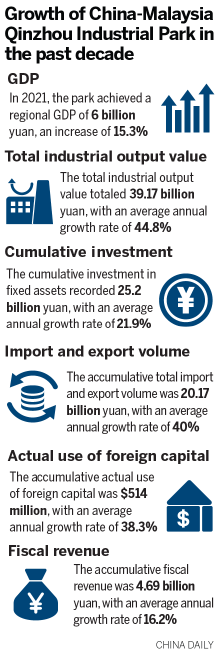Industrial parks push countries to new heights【China-Malaysia Qinzhou Industrial Park, Regional logistics, Cross-border financial services】
2022.04.01 SOURCE: CHINA DAILY
Ten years of collaboration in key projects achieves spike in trade and revenue
This year marks the 10th anniversary of the founding of China-Malaysia Qinzhou Industrial Park in Qinzhou, Guangxi Zhuang autonomous region.
Upholding the new development concept of innovation, coordination, greenness, openness and sharing, and with the support of the governments of both countries, the industrial park in Qinzhou has developed fast over the decade.
It has also provided a series of valuable, innovative, exploratory and leading experiences and practices for China to promote high-level opening-up.
For instance, the industrial park in Qinzhou has carried out trials on cross-border financial services; launched cross-border renminbi interbank financing business; and provided RMB liquidity support for the construction of an industrial park in Kuantan, Malaysia.
It has carried out loans for overseas projects, allowing pilot banks to provide RMB loans to projects in its sister industrial park; carried out cross-border two-way RMB flow assistance; simplified the process for offshore transfer of RMB bank settlement accounts of overseas institutions; and carried out the RMB credit asset transfer business, allowing pilot banks to carry out RMB credit asset transfers abroad.
Over the past decade, the two industrial parks in Qinzhou and Kuantan have normalized their policy exchanges and Qinzhou Port and Kuantan Port have become sister ports.
The first deep-water berth of Kuantan Port, which was built with Chinese shares, has been opened as well as a two-way direct container shipping route between Qinzhou Port and Kuantan Port, jointly building an important route to serve the Belt and Road Initiative and the new land-sea corridor in the region.
In 2021, the total value of Malaysian goods imported and exported through Qinzhou Customs reached 7.08 billion yuan ($1.11 billion), up 26.8 percent year-on-year. The main import and export commodities are Musang King durian, bird's nest, coffee and mechanical and electrical products.
At present, Malaysia is Guangxi's third-largest trading partner in the Association of Southeast Asian Nations.
In 2021, despite the COVID-19 pandemic, the bilateral trade volume increased 53.5 percent year-on-year, hitting $1.9 billion.
And Malaysia is the largest investment destination for Guangxi enterprises in ASEAN, with a two-way investment of $2.5 billion in 2021.
Over the past decade, the industrial park in Qinzhou has made a unique contribution to the forming of a China-ASEAN industrial chain of the edible bird's nest, expanded Malaysia's export of edible bird's nest and durian to China, and intensified people-to-people and cultural exchanges between the two sides.
The collaboration between the two industrial parks is expanding to cooperation between the cities.
For example, Qinzhou Daily and Malaysia's Sin Chew Daily have become sister newspapers.
Meanwhile, the industrial park in Qinzhou and Universiti Tunku Abdul Rahman of Malaysia have formed a cooperation and exchange program to build an international joint incubator for innovation and entrepreneurship in Qinzhou.
Almost all overall economic indicators regarding the industrial park in Qinzhou have shown a rapid upward trend. By the end of 2021, the industrial park achieved a cumulative total GDP of 17.17 billion yuan and a cumulative total industrial output value of 39.17 billion yuan.
The total investment in fixed assets in the industrial park hit 25.2 billion yuan. And the total amount of foreign investment the industrial park has used reached $514 million. The industrial park generated a total revenue of 4.69 billion yuan.
Up to now, 18 Malaysian-funded enterprises have registered in the industrial park in Qinzhou. They are mainly in the food-processing industry or trade in speciality products from ASEAN.
These companies will enjoy better tariff rates on bird's nest, durian and other products imported from Malaysia than in the previous free-trade agreement, which will help them reduce production costs and expand the scale of the consumer market.
The remarkable achievements the industrial park made over the past decade have laid a solid foundation for its future development.
The two sides should accelerate the building of a demonstration zone for cross-border financial cooperation, construct a special zone to attract and cultivate international talents, as well as the formation of cross-border industrial chains, supply chains and value chains in electronic information, low carbon, new materials and high-added-value characteristic industries under the Regional Comprehensive Economic Partnership rules and standards, so as to assist trade and investment, and promote reform and opening-up.
In the long run, Qinzhou aims to take advantage of the industrial park to build itself into a regional logistics, services and industrial hub with influence across Southeast Asia and beyond.
This story is provided by Lin Guan, Party chief of Qinzhou.
